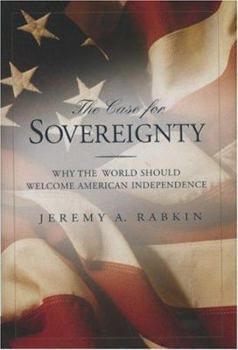The Case for Sovereignty: Why the World Should Welcome American Independence
Sovereign nations now readily submit their domestic policies to international agreements and supranational institutions. Jeremy Rabkin warns that international regulation, such as the Kyoto Protocol's... This description may be from another edition of this product.
Format:Paperback
Language:English
ISBN:0844741833
ISBN13:9780844741833
Release Date:January 2004
Publisher:AEI Press
Length:257 Pages
Weight:1.25 lbs.
Dimensions:1.0" x 6.3" x 9.2"
Customer Reviews
2 ratings
A Timely Warning against Transnational Legal Standards
Published by Thriftbooks.com User , 16 years ago
Without a doubt, Rabkin's book represents a timely addition to an important debate. The perspective he brings to bear, including a healthy skepticism about the questionable normative commitments underlying appeals to transnational legal standards and a hard-nosed look at the actual efficacy of efforts to realize "global governance," is provocative and perhaps underemphasized. At the same time, the book often lacks the analytical rigor that would make it a more serious challenge to advocates of global governance. At bottom, the book's argument turns on the claim that the normative commitments Rabkin holds dear (limited government, individual autonomy, and consent-based politics) are fundamentally incompatible with a commitment to transnational legal codes, defined and enforced by supranational organizations. Yet this central part of the argument is largely asserted rather than being established through careful arguments. Moreover, for readers familiar with the insights of modern political science, in particular public-choice theory, Rabkin's almost mystical faith in the ability of national political systems (specifically national legislatures) to realize "the public good" is likely to be perplexing. Although he surely identifies important deficiencies in transnational legal institutions as they currently exist, he largely glosses over similar inadequacies at the domestic level that are likely to introduce the same kinds of distortions that he fears at the international level (for example, the disproportionate influence of "elites" or special-interest minorities). Rabkin also tends to lump together arguments and positions that are more nuanced and differentiated than he acknowledges. The book sometimes descends into mere polemical non sequiturs. For example, after recounting the Srebrenica massacre of 1995, in which Serb forces slaughtered more than eight thousand Bosnian Muslims while Dutch United Nations peacekeepers did nothing to intervene, Rabkin offers the following "explanation" for the actions of the Dutch soldiers: "It should not have been very surprising. In 1940, the Dutch relied on international law for their protection and were overrun by Germany in a matter of hours. A Dutch resistance movement did not develop for several years--well after the Dutch allowed their Jewish fellow citizens to be rounded up for extermination. Were the Dutch now going to take risks for people on the other side of Europe?" (p.180). In short, LAW WITHOUT NATIONS deals with a significant topic that is only likely to grow in importance as increasing global economic and political interdependencies give rise to calls for an expanded role for transnational governance. Rabkin's plea for the importance of sovereign nation-states in protecting the values of individual liberty and autonomy that are the hallmark of the Western political tradition is provocative. Although the book does not present the strongest case that can be made for its position, its arguments sh
A argument that America must stay true to its decisions
Published by Thriftbooks.com User , 19 years ago
The Case For Sovereignty: Why The World Should Welcome American Independence by Jeremy A. Rabkin (Professor, Department of Government, Cornell University) is a forceful argument that America must stay true to its decisions first and the will of other nations such as European countries and even international law. Claiming that allowing international law to hold priority over the Constitution would be fundamentally at odds with American democracy, using European derision of America's will to invade Iraq under President George W. Bush as an example of a supposed attempt to restrict American sovereignty, The Case For Sovereignty explores the lessons of history to create a detailed, well-researched, exhortively argued an unapologetic manifesto for daring to remain at international odds as a nation.





